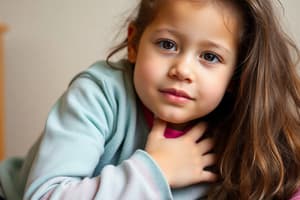Podcast
Questions and Answers
What is the main issue in children with PTSD?
What is the main issue in children with PTSD?
- Environmental factors that add stress
- Dependence on adults and systems (correct)
- Biological factors
- Genetic factors
What is the first stage of intervention for children with PTSD?
What is the first stage of intervention for children with PTSD?
- Provide safety and stabilization (correct)
- Develop a value system
- Catch up on developmental and social skills
- Reduce arousal and regulate emotion
What is the second stage of intervention for children with PTSD?
What is the second stage of intervention for children with PTSD?
- Develop a value system
- Provide safety and stabilization
- Reduce arousal and regulate emotion through symptom reduction (correct)
- Catch up on developmental and social skills
What is the third stage of intervention for children with PTSD?
What is the third stage of intervention for children with PTSD?
What is the main psychological factor that contributes to PTSD in children?
What is the main psychological factor that contributes to PTSD in children?
What is the main neurobiological factor that contributes to PTSD in children?
What is the main neurobiological factor that contributes to PTSD in children?
What is the main trigger for dissociation in children with PTSD?
What is the main trigger for dissociation in children with PTSD?
What is the main benefit of using art and play in interventions with children with PTSD?
What is the main benefit of using art and play in interventions with children with PTSD?
What is the main goal of the first stage of intervention for children with PTSD?
What is the main goal of the first stage of intervention for children with PTSD?
What is the main goal of the second stage of intervention for children with PTSD?
What is the main goal of the second stage of intervention for children with PTSD?
What is the main goal of the third stage of intervention for children with PTSD?
What is the main goal of the third stage of intervention for children with PTSD?
What is the main role of nurses in the care of children with PTSD?
What is the main role of nurses in the care of children with PTSD?
Flashcards are hidden until you start studying
Study Notes
Main Issues in Children with PTSD
- Children with PTSD often experience difficulties in emotional regulation, leading to anxiety, depression, and behavioral issues.
- Symptoms may include flashbacks, nightmares, and heightened startle responses impacting daily functioning and relationships.
Stages of Intervention for Children with PTSD
- First Stage: Stabilization and safety are prioritized, creating a secure environment for the child.
- Second Stage: Trauma processing occurs, where children begin to explore and express their traumatic experiences in a controlled manner.
- Third Stage: Integration focuses on developing coping strategies and promoting resilience to prevent future PTSD manifestations.
Psychological and Neurobiological Factors
- Main Psychological Factor: Dysregulation of emotions contributes significantly to the development of PTSD in children.
- Main Neurobiological Factor: Alterations in brain structures associated with stress responses, particularly the amygdala and hippocampus, play a crucial role.
Triggers and Benefits in Interventions
- Main Trigger for Dissociation: Overwhelming stress can lead to dissociation as a coping mechanism, separating the child from the traumatic experience.
- Benefit of Art and Play: These expressive therapies provide a non-threatening means for children to process trauma, facilitating communication of feelings and experiences.
Goals of Intervention Stages
- First Stage Goal: Establish a sense of safety and stability for the child to reduce immediate distress.
- Second Stage Goal: Allow the child to confront and make sense of the trauma, improving emotional expression and processing.
- Third Stage Goal: Enhance coping mechanisms and resilience, enabling the child to integrate experiences and function effectively in daily life.
Role of Nurses in Care
- Nurses play a crucial role in providing support, monitoring psychological responses, and implementing interventions that foster emotional security and healing in children with PTSD.
Studying That Suits You
Use AI to generate personalized quizzes and flashcards to suit your learning preferences.




